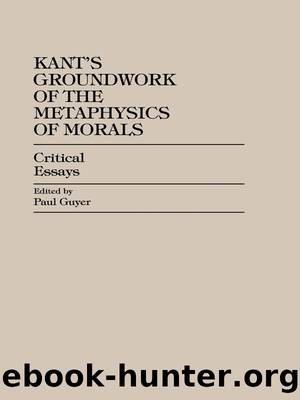Kant's Groundwork of the Metaphysics of Morals by Paul Guyer

Author:Paul Guyer
Language: eng
Format: epub
ISBN: 9780585080727
Publisher: Rowman & Littlefield Publishers
Published: 2013-07-10T16:00:00+00:00
1. What Is an ‘End in Itself’?
FH is introduced by way of an inquiry into the possibility of a will’s conforming itself to a categorical imperative or practical law. It is supposed to address a question to which many of Kant’s critics think he has no good answer: namely, why—for what reason or motive, or in the name of what value—should we obey categorical imperatives? FH formulates the moral law in terms of the value which provides the kind of ground or reason which could motivate a rational being to act on a categorical imperative. In other words, FH provides the content of what Kant described in the First Section of the Groundwork as the motive of duty—an idea which many have found objectionably cold, empty and forbidding. It may make that idea more attractive to realize that for Kant, to act from duty means to act out of esteem for the worth of humanity in someone’s person as an end in itself. We then see that when Kant regards the cold-hearted man who helps others from duty as more deserving of esteem than the warm-hearted person who helps them from sympathy, he is not saying that it is bad to care about people and good only to follow abstract rules. Instead, he is saying that it is better to care about people because we recognize them as beings with worth and dignity, who have a genuine claim on our concern, than because we just happen to like them or because in our present mood helping them makes us feel good.
Kant distinguishes two types of grounds on which a will may act: subjective grounds, based on empirical desire for an object, and an objective ground, which is also an end, but one given by reason alone and valid for all rational beings. A subjective ground is called an “incentive” (Triebfeder), while an objective ground is called a “motive” (Bewegungsgrund) (G, 427-428). The most striking thing Kant says here is that a motive must always be an end (Zweck). This might seem to contradict what he says elsewhere. In the Critique of Practical Reason, for instance, Kant distinguishes between “formal principles” of the will, whose determining ground consists solely in the “legislative form” of the agent’s maxim, and “material principles,” whose determining ground is the end of the action. Formal principles alone, Kant says, can be practical laws; material principles are all empirical, fall under the principle of one’s own happiness, and are opposed to the determination of the will by reason alone (CPracR, 5:21-22).
Yet on closer inspection there is no real disagreement between the two texts. The Groundwork draws the same distinction between “formal” and “material” principles, characterizing material principles as based on “incentives,” and formal principles as based on motives (G, 427). When the second Critique says that the ground of a formal principle is the “legislative form of the maxim,” that is “the mere form of giving universal law” (5:27), the Groundwork merely tells us that this form, when it motivates us, constitutes a certain distinctive kind of end.
Download
This site does not store any files on its server. We only index and link to content provided by other sites. Please contact the content providers to delete copyright contents if any and email us, we'll remove relevant links or contents immediately.
The remains of the day by Kazuo Ishiguro(7551)
Tools of Titans by Timothy Ferriss(6948)
The Black Swan by Nassim Nicholas Taleb(6192)
Inner Engineering: A Yogi's Guide to Joy by Sadhguru(5897)
Giovanni's Room by James Baldwin(5878)
The Way of Zen by Alan W. Watts(5800)
The Six Wives Of Henry VIII (WOMEN IN HISTORY) by Fraser Antonia(4791)
The Power of Now: A Guide to Spiritual Enlightenment by Eckhart Tolle(4755)
Astrophysics for People in a Hurry by Neil DeGrasse Tyson(4620)
Asking the Right Questions: A Guide to Critical Thinking by M. Neil Browne & Stuart M. Keeley(4576)
12 Rules for Life by Jordan B. Peterson(3734)
The Ethical Slut by Janet W. Hardy(3503)
Skin in the Game by Nassim Nicholas Taleb(3461)
Housekeeping by Marilynne Robinson(3401)
The Art of Happiness by The Dalai Lama(3384)
Double Down (Diary of a Wimpy Kid Book 11) by Jeff Kinney(3273)
Skin in the Game: Hidden Asymmetries in Daily Life by Nassim Nicholas Taleb(3264)
Walking by Henry David Thoreau(3234)
12 Rules for Life: An Antidote to Chaos by Jordan B. Peterson(3203)
